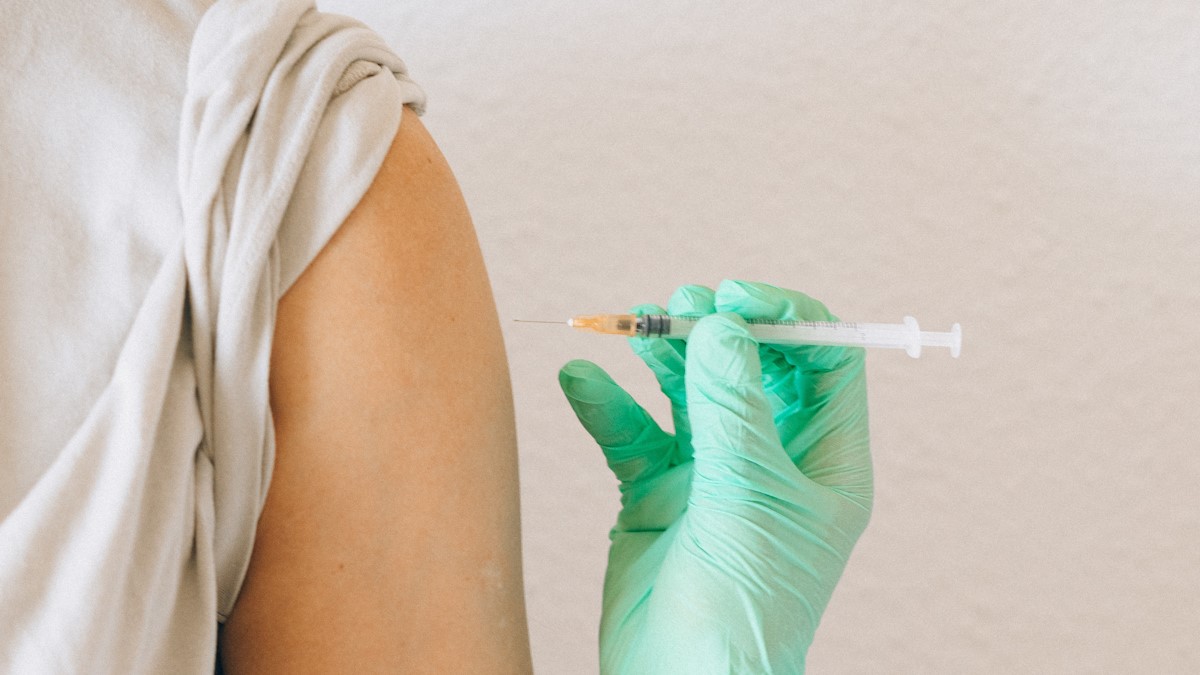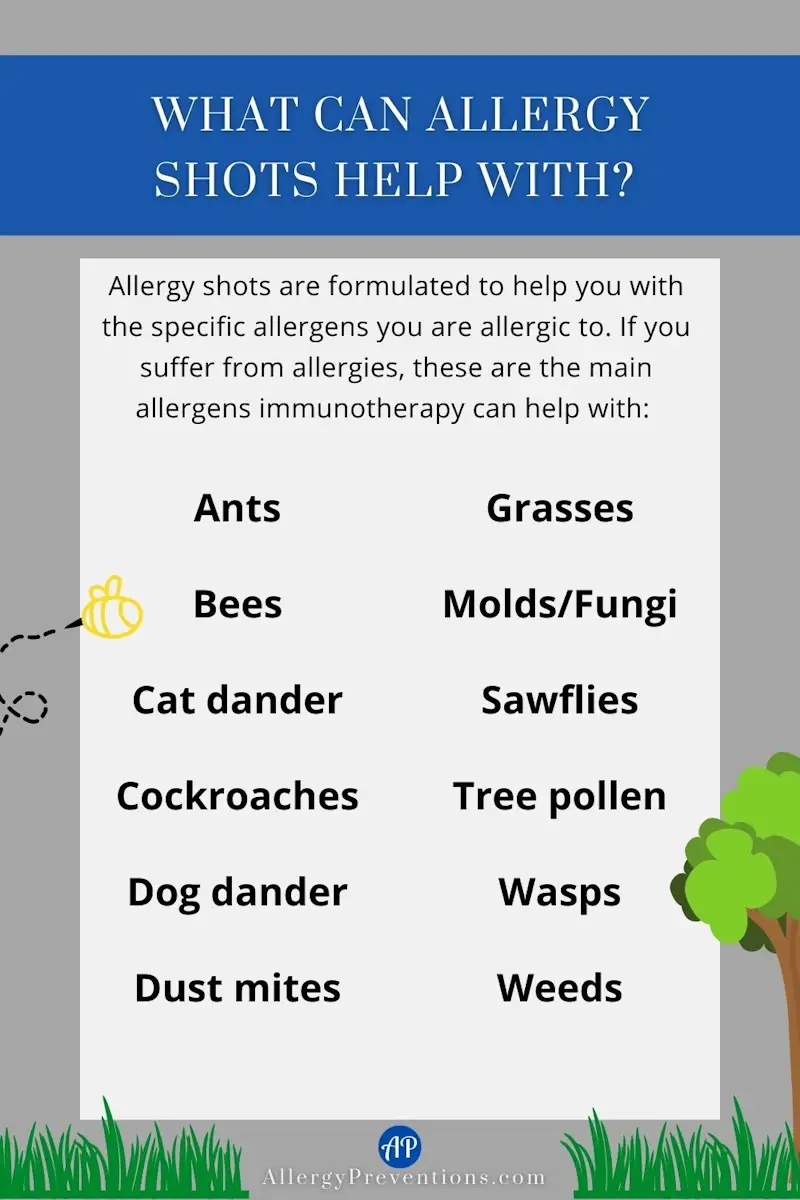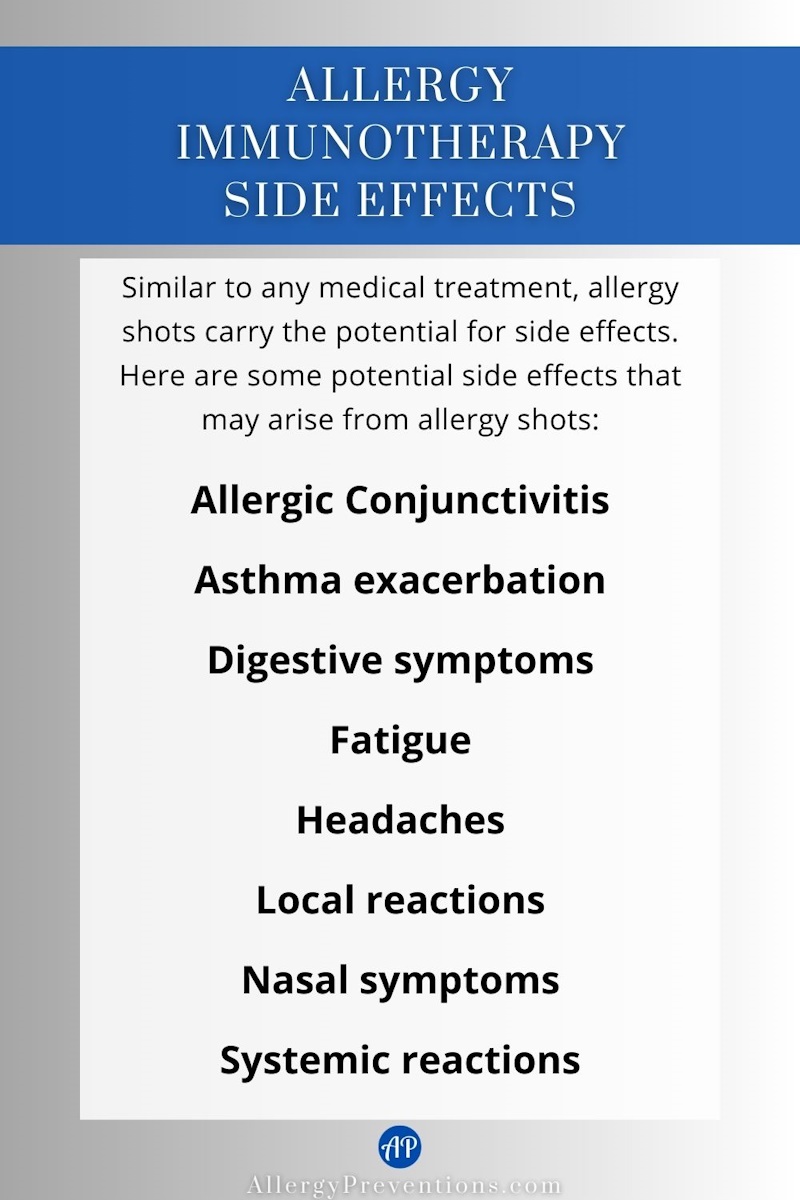Allergy shots may be something you want to consider if your allergies are causing you significant inconvenience or discomfort. The constant sneezing, itching, watery eyes, and congestion can make daily life challenging, and medications don’t always work. This is where allergy shots (immunotherapy) come into the picture. In this article, I will share my personal experiences and we will explore the effectiveness, process, and benefits of allergy shots as a long-term solution for allergies.

Table of Contents
Allergy Shots Explained
Allergy shots are a form of allergen-specific immunotherapy that involves injecting small amounts of allergens into the body over a period of time. The allergens used in the shots are specifically tailored to an individual’s allergies; like a tailor-made dress or suit for your immune system. The purpose of allergy shots is to desensitize the immune system to the allergens, gradually reducing or eliminating the allergic response.
We want to teach your body to chill out when it comes in contact with allergens. Allergy shots are like a friendly conversation with your body, saying “Hey, immune system, no need to freak out every time you encounter a cat or some pollen, okay?” We want to dial down that allergic response.
Think of allergy shots as a slow dance with your immune system. You start off with a small dose, then gradually increase it over time. The goal? To make your immune system go, “Hey, this allergen is no big deal!” And before you know it, you’re walking through fields of flowers without a care in the world (hopefully).
Allergy Shots vs Immunotherapy

Allergy shots are a specific type of immunotherapy where small amounts of allergens are injected into your body to desensitize your immune system. Immunotherapy is a broad term that captures all treatments that use your own immune system to combat diseases, autoimmune disorders, and allergies.
Who can benefit from allergy shots?

Allergy shots can be beneficial for adults who suffer from a wide range of allergies including allergic rhinitis (hay fever), allergic asthma, pet dander, dust mite, and seasonal allergies. They are particularly effective for adults who have not found adequate relief from medication or who experience significant side effects from medication.
But here’s the thing, it’s not just for anyone and everyone. Immunotherapy is typically recommended for those who have allergies that stick around for the long haul. We’re talking about allergies that just won’t quit. If you’re in it for the long run, these shots might be your secret weapon.
It’s also worth mentioning that these shots are often considered for folks who have severe allergic reactions. You know, those who experience life-disrupting symptoms that really put a damper on their quality of life. We wanna help you get back in the game and enjoy life to the fullest.
What allergies do allergy shots help with?

Allergy shots are formulated to help you with the specific allergens you are allergic to. If you suffer from allergies, these are the main allergens immunotherapy can help with:
- Ants
- Bees
- Cat dander
- Cockroaches
- Dog dander
- Dust mites
- Grasses
- Molds/Fungi
- Sawflies
- Tree pollen
- Wasps
- Weeds
Who should avoid allergy shots?
Now, allergy shots can work wonders for many adults seeking relief from their pesky allergies, but they’re not for everyone. There are certain factors that may make this treatment option less appropriate for certain individuals.
Have A Fear of Needles

If you’re someone who has a serious fear of needles, well, let’s just say these shots might not be your cup of tea. You want to be comfortable and at ease during your treatment, after all.
I don’t like needles, I would say it’s a slight fear, but I am still able to get allergy shots. The perk is the shots are given on the back of the arm, so I can’t see the injection happening. Additionally, the needles feel way smaller than any other immunization which helps big time.
Unable to Commit Long-Term

If you’re a busy bee with a super-packed schedule, allergy shots might pose some challenges. They require a time commitment, my friends. 3 – 5 years. You got to be ready for those regular visits to the doctor’s office for your injections. So, if your calendar is already bursting at the seams, you might wanna consider other options.
Have Certain Medical Conditions

Now, there are also certain medical conditions that might make immunotherapy a no-go. If you have certain heart or lung conditions, uncontrolled asthma, or if you’re pregnant, it’s important to have a chat with your healthcare professional. They’ll help you figure out if allergy shots are the right path for you or if there are alternative allergy shot options to explore.
Your Allergy Symptoms Are Mild

If your allergies are pretty mild and don’t significantly impact your day-to-day life, you might not necessarily need allergy shots. For adults who can manage their symptoms on their own or with allergy OTC medications, allergists typically do not recommend immunotherapy. Medical professionals want to focus on those who truly need the extra boost to tackle their allergy symptoms head-on.
Looking for Food Allergy Relief

Food allergies involve a different mechanism in the immune system compared to environmental allergies and have a different route of exposure (ingested vs exposed). Food allergy shots are not considered effective or safe for the treatment of food allergies.
Other approaches under investigation for food allergies include oral immunotherapy (OIT), where small amounts of the allergen are ingested under medical supervision to build tolerance, but this approach is still considered experimental and not widely available.
There have been numerous studies proving that antihistamines help food allergy symptoms. If you suffer from food allergies, talk with your doctor about the best options for you.
The Allergy Shot Treatment Process

Allergy shots offer a systematic and long-lasting approach to combatting allergies, helping individuals build a tolerance to the allergens that trigger their symptoms. The immunotherapy process involves testing, the build-up phase, and the maintenance phase.
Allergy Testing
Before starting allergy shots, an allergist will perform a thorough medical history as well as allergy testing to identify the specific allergens causing your symptoms. This test is called the Skin Prick Test (SPT).
Skin Prick Test
A skin prick test, also known as a puncture or scratch test, is a non-invasive method used to diagnose allergies. It helps determine which specific substances, such as pollen, pet dander, or certain foods, trigger an allergic reaction in an individual. By introducing small amounts of allergens into the skin, healthcare professionals can observe the body’s reaction and identify potential allergens.
How does it work?
A healthcare hero takes a drop of allergen extract and places it on your forearm or back. And then, using a tiny, sterile lancet, they give your skin a friendly little prick or scratch. Don’t worry, it’s not as bad as it sounds! This allows the allergen to work its magic and interact with your skin. If you’re allergic to that particular substance, your immune system jumps into action, causing a localized commotion of redness, itching, or swelling.
SPT Results

After a designated waiting period, typically around 15-20 minutes, the healthcare professional will examine the test sites for any signs of allergic reactions. The size of the wheals or bumps formed on the skin indicates the intensity of the allergic response.
Positive reactions are characterized by larger, raised wheals, whereas negative results show no significant reaction. Interpretation of the results requires medical expertise to differentiate between true allergies and irritant reactions.
My SPT results showed that I was allergic to just about everything they tested for, which meant my arm was quite itchy! after the results are documented the allergist will wipe off the allergens and usually tell you to take your allergy meds at that time.
Customized Treatment Plan

Once your specific allergens are identified, the allergist will create a customized treatment plan tailored to your needs. The plan will outline the specific allergens to be used in the shots, the dosages, and the frequency of the shots.
Your allergy shot vials will need to be made. This process can take from a few weeks to a few months, depending on if they are made in-house or sent out to a facility. Once your vials arrive back at the allergist, you will be able to set up an appointment for your first allergy shot!
The Build-Up Phase

The treatment starts with the build-up phase, during which the allergen extracts are administered in gradually increasing doses. The doses gradually increase over time, allowing your body to adapt and develop immunity. Initially, the shots are given once or twice a week, and the dose is increased over several months until the target dose is reached.
The completion of the build-up phase can range from a few months to a year. The timeline is based on your tolerance to increasing doses as well as how often you are going in to get the shots.
With my allergy shots, my build-up phase took about 4 months…the first time. I ended up moving to a new location and the new allergist wanted to restart the process from the beginning. The second round of build-up was about 6 months.
The Maintenance Phase

Once the target dose from the build-up phase is reached, the maintenance phase begins. During this phase, the shots are typically given once every few weeks or months, depending on the individual’s response to the treatment.
The maintenance phase usually lasts for three to five years, although the duration may vary depending on the individual’s response and the severity of their allergies. My maintenance phase (which I am currently in) is set to last about 3 years. My 3-year plan was calculated based on going in once a month once I reached the maintenance phase.
Missing An Allergy Shots Dose

Missing an allergy shot dose in the build-up and maintenance phase is typically not a big issue, but it depends on how long it has been from your last dose. If you miss your build-up dose by a day or two, your provider may have you repeat the same dose that you received during your last visit.
If you are two weeks late, then you may have to step down a dose. If you are in the maintenance phase, you may have to complete some of the build-up phase again, before you are back on the maintenance dose.
Do allergy shots work?

Numerous studies have shown that allergy shots can be highly effective in reducing allergy attack symptoms and improving quality of life. The results of these studies can be summarized by stating allergy shots:
- Improve allergy symptoms
- Lessen the dependence on medications
- Improve overall quality of life
It’s important to note that the effectiveness of immunotherapy may vary from person to person. Some adults may experience significant improvement, while others may see a more modest reduction in symptoms.
I am still in the maintenance phase of my treatment but I have definitely experienced fewer allergy symptoms, I am taking fewer allergy medicines, and of course, those benefits are improving my quality of life.
Allergy Immunotherapy Side Effects

Like any medical treatment, allergy shots come with the risk of side effects. The most common side effects include redness, swelling, or itching at the injection site. Here is a list of potential allergy shot side effects:
- Allergic Conjunctivitis: Allergy shots can occasionally cause allergic conjunctivitis, resulting in redness, itching, and watering of the eyes.
- Asthma exacerbation: In individuals with asthma, allergy shots may trigger asthma symptoms, leading to increased coughing, wheezing, chest tightness, and shortness of breath.
- Digestive symptoms: Upset stomach, nausea, vomiting, or diarrhea can occur as side effects in some individuals.
- Fatigue: Temporary fatigue or drowsiness following the injections.
- Headaches: Headaches may occur as a side effect of allergy shots in some individuals.
- Local reactions: Redness, swelling, itching, or pain at the injection site.
- Nasal symptoms: Increased nasal congestion, runny nose, or sneezing.
- Skin reactions: Rarely, allergy shots may cause generalized itching, rashes, or swelling in areas away from the injection site.
- Systemic reactions: Hives, itching, nasal congestion, sneezing, coughing, wheezing, shortness of breath, throat tightness, abdominal pain, nausea, or dizziness.
During my injections, I get a little bit of localized redness and swelling, as well as fatigue. My fatigue is not severe, and it actually makes me feel quite calm. Sometimes there is a delay with allergy shot side effects, where symptoms may not appear until hours after your injection.
In rare cases, more serious allergic reactions may occur, such as difficulty breathing or anaphylaxis. This is why allergy shots should always be administered under the supervision of a qualified allergist in a medical setting. If you are experiencing any alarming symptoms, seek medical care immediately.
Long-term Side Effects of Allergy Shots
After discontinuing allergy shots, adults may experience several positive long-term effects, including a decrease in nasal symptoms, reduced use of rescue medications, and an overall improvement in their quality of life. There is currently no evidence or studies that identify any long-term immunological or biological negative effects from allergy immunotherapy.
Allergy Shots Frequently Asked Questions (FAQs)
How long does it take for allergy shots to work?
You might not notice any change in symptoms in the first couple of months, but the longer you stick with it, the better the improvement of symptoms. The complete process takes 3 – 5 years.
Are allergy shots covered by insurance?
Many insurance plans provide coverage for allergy shot treatment, but coverage can vary. It’s best to check with your insurance provider to understand your specific coverage details.
Can allergy shots be used for food allergies?
No. There are currently no effective or approved allergy shots for food allergies.
What size needle is used for allergy shots?
Allergy shot injections use a 27-gauge needle. In comparison, a standard immunization needle ranges from 22 – 25 gauge.
Can you miss a week of allergy shots?
Yes, you can miss a week of allergy shots without affecting the long-term efficacy. Missing a week or more since your last dose may require your medical provider to repeat or lower the next dose.
